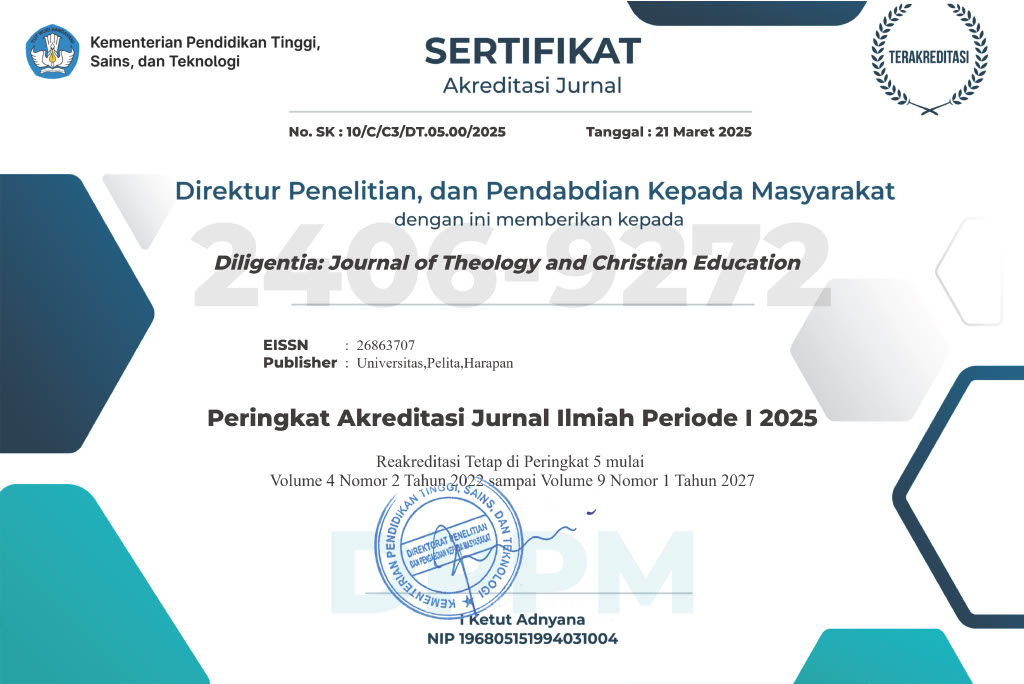A Theological Review of Approaching Models in the Dialog of Faith and Science
DOI:
https://doi.org/10.19166/dil.v1i1.1889Keywords:
faith and science, reconstruction, biblical Christian worldviewAbstract
Scholars have been proposing numerous models in “reconciling” faith and science. All proposed models, generally, could be categorized into four approaches: conflict, independence, dialogue, and integration. Since models in approaching the dialog of faith and science, basically, express presuppositions of how someone view reality. In this essay, therefore, these models are reviewed in the light of how Christians should comprehend the reality through the Scripture: God reveals Himself in two ways, general and special. General revelation is the world as His creation, and special revelation is the His words that have been written in the Bible. Special revelation, fundamentally, is a metaphysical framework for Christians to understand God’s creation. As the result, approaching model which cohere to biblical concept of one truth is integration model, which is, as some scholars call, the reconstruction or paradigmatic approach.
References
Barbour, Ian G. Religion and Science: History and Contemporary Issue. San Fransisco: Harper, 1997.
Bavinck, Herman. Reformed Dogmatics. Volume 1, Prolegomena. Translated by John Bolt and John Vriend. Grand Rapids, MI: Baker Academic, 2003.
Bloesch, Donald G. Holy Scripture: Relevation, Inspiration and Interpretation. Downers Grove, IL: IVP, 1994.
Bonting, Sjoerd L. Creation and Double Chaos : Science and Theology in Discussion. Minneapolis, MN: Fortress Press, 2005.
Bube, Richard. “Toward a Christian View of Science.” Journal of the American Affiliation 32, no. 4 (1973).
Clark, Gordon H. The Philosophy of Science and Belief in God. 3rd ed. Nutley, NJ: The Craig Press, 1964.
Demarest, Bruce A. General Revalation: History Views and Contemporary Issue. Grand Rapids, MI: Zondervan, 1982.
Eck, Brian E. “Integrating the Integrators: An Organizing Framework for a Multifaceted Process of Integration.” Journal of Psycholohy and Christianity 15 (1996).
Erickson, Millard J. Christian Theology. 2nd ed. Grand Rapids, MI: Baker Publishing Group, 1998.
Estep Jr., James R., Michael J. Anthony, and Gregg R. Alison. No Title. Nashville, TN: B & H Publishing Group, 2008.
Gould, Stephen Jay. “Non-Overlapping Magisteria.” Natural History, 1997.
Hoeksema, Herman. Reformed Dogmatics. Grand Rapids, MI: Reformend Free, 1985.
John M. Frame. Cornelius Van Til: An Analysis of His Thought. Phillipsburg, NJ: Presbyterian and Reformed, 1995.
Lane, David H. “Special Creation or Evolution.” Bibliotheca Sacra 151, no. 601 (1999).
McGrath, Alister E. Science and Religion: An Introduction. Malden, MA: Blackwell Publishers, 1999.
McGrath, Alister E.. The Foundations of Dialogue in Science and Religion. Malden, MA: Blackwell Publishers, 1998.
McIntosh, Andy. Genesis for Today. Surrey: Day One, 1997.
Morris, Henry, and Gray E. Parker. What Is Creation Science? San Diego, CA: Creation-Life, 1982.
Murphy, Nancy. Reconciling Theology and Science: A Radical Reformation Perspective. Kicthener, Ontario: Pandora, 1997.
Murphy, Nancy. “What Has Theology to Learn from Scientific Methodology.” In Science and Theology, edited by Murray Rae, Hilary, and John Stenhouse. Edinburgh: T&T Clark, 1994.
Provine, William. “Scientists Face It! Science and Religion Are Incompatible.” The Scientist 2 (1988).
Ryrie, Charles C. Basic Theology. Wheaton, IL: Victor Books, 1986.
Swindoll, Charles, and Roy B. Zuck. Understanding Christian Theology. Nashville, TN: Thomas Nelson, 2003.
Til, Cornelius van. Introduction to Systematic Theology. Edited by Willian Edgar. Phillipsburg, NJ: Presbyterian and Reformed, 2007.
Downloads
Published
How to Cite
Issue
Section
License
Authors who publish with this journal agree to the following terms:
1) Authors retain copyright and grant the journal right of first publication with the work simultaneously licensed under a Creative Commons Attribution License (CC-BY-SA 4.0) that allows others to share the work with an acknowledgement of the work's authorship and initial publication in this journal.
2) Authors are able to enter into separate, additional contractual arrangements for the non-exclusive distribution of the journal's published version of the work (e.g., post it to an institutional repository or publish it in a book), with an acknowledgement of its initial publication in this journal.
3) Authors are permitted and encouraged to post their work online (e.g., in institutional repositories or on their website). The final published PDF should be used and bibliographic details that credit the publication in this journal should be included














